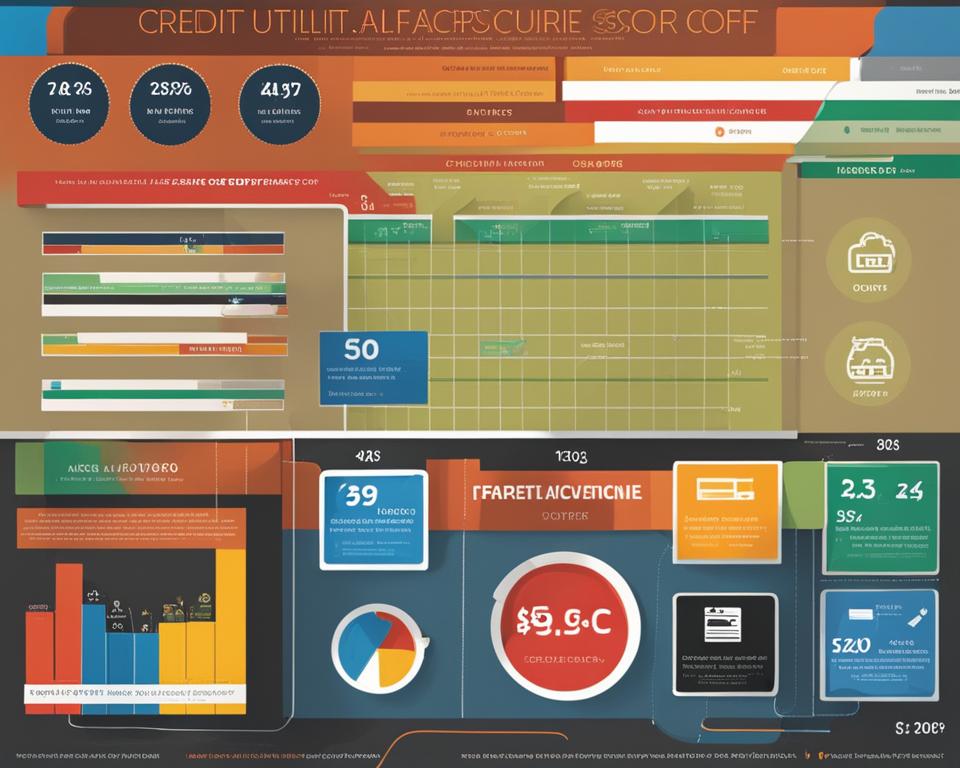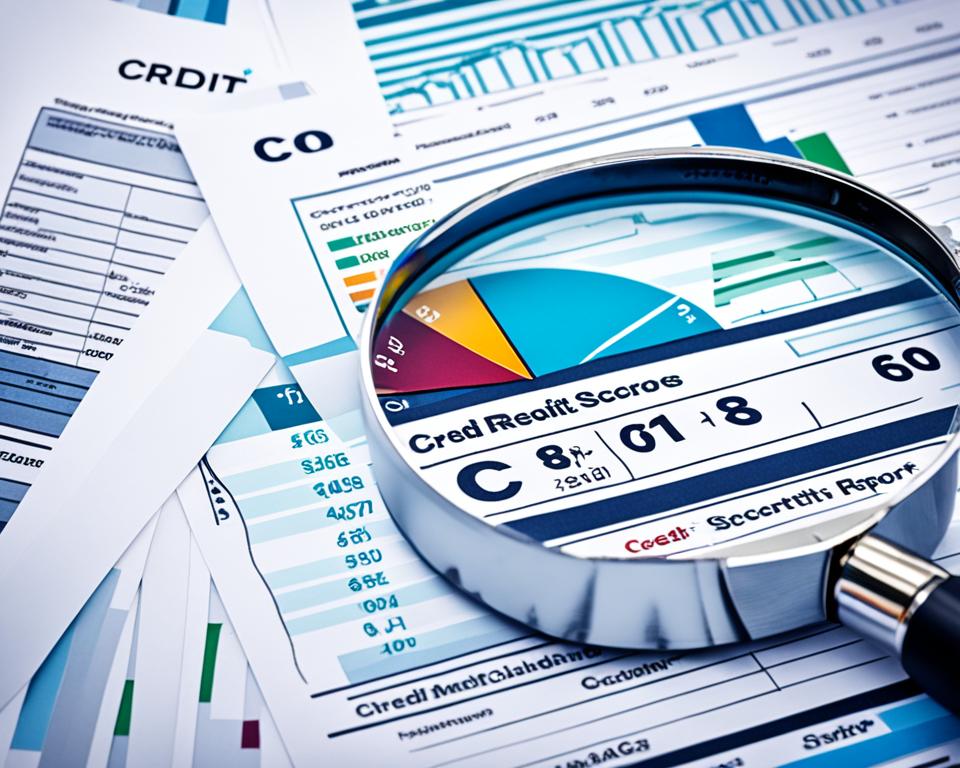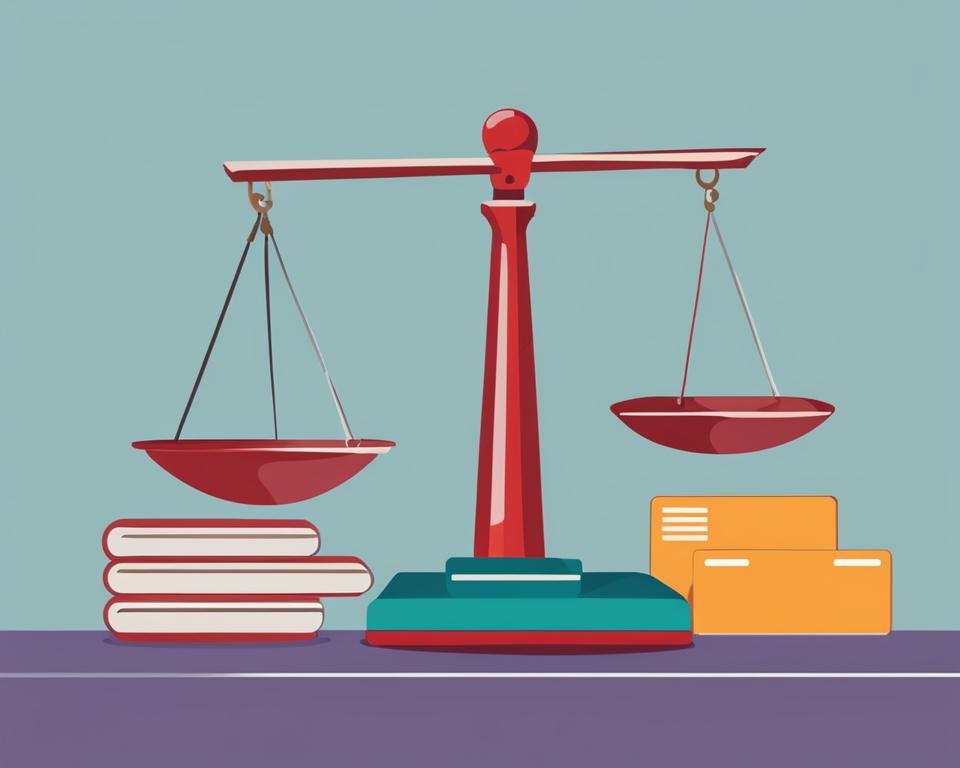When it comes to credit scores, accuracy is key. Understanding which credit score is the most accurate can make a significant difference in your financial decisions and opportunities. In this article, we will delve into the world of credit scores, exploring different scoring models, credit-scoring companies, and factors that affect scores. By the end, you’ll have a clear idea of how to navigate the credit scoring landscape and make the best choices for your financial well-being.
Key Takeaways:
- Multiple credit-scoring models are used by different lenders and credit bureaus.
- Credit scores are calculated based on information in credit reports.
- FICO and VantageScore are two well-known credit-scoring companies.
- Factors such as payment history, credit utilization, credit mix, and new credit applications influence credit scores.
- FICO and VantageScore offer different credit-scoring models.
Understanding Credit Scores and Credit Reports
Credit scores play a crucial role in determining an individual’s creditworthiness. These three-digit numbers are calculated based on the information present in credit reports. Understanding how credit scores work and the role of credit bureaus is essential in managing one’s financial well-being.
How Credit Scores Are Calculated
Credit scores are derived from the data collected by credit bureaus. The three major credit bureaus in the United States are Equifax, Experian, and TransUnion. These bureaus receive information from lenders and creditors regarding individuals’ borrowing and payment behaviors. Using this data, the bureaus generate credit reports, which serve as the foundation for calculating credit scores.
Variations in Credit Scores
It’s important to note that credit scores can vary across different credit bureaus and scoring models. Each credit bureau may use a different scoring algorithm to evaluate creditworthiness. As a result, individuals may observe variations in their credit scores when comparing reports from different bureaus. These differences can be attributed to the various factors considered and the weight assigned to each factor by different scoring models.
| Factors Influencing Credit Scores | Explanation |
|---|---|
| Credit History | The length of an individual’s credit history and their payment patterns significantly impact credit scores. A longer credit history with consistent, timely payments tends to result in higher scores. |
| Credit Utilization | The amount of credit utilized compared to the total credit available, known as the credit utilization ratio, is another essential factor. Keeping credit card balances low and utilizing a smaller percentage of available credit can positively impact scores. |
| Payment History | Making payments on time is crucial for maintaining a good credit score. Late payments, collections, and defaults can significantly impact credit scores. |
| Credit Mix | A diverse credit mix, including different types of borrowing such as credit cards, mortgages, and installment loans, can positively influence credit scores. It demonstrates an individual’s ability to manage a variety of credit responsibly. |
| New Credit Applications | Opening multiple new credit accounts within a short period can negatively impact credit scores. It is important to avoid excessive credit applications, as they can be regarded as a higher credit risk. |
Comparing Credit Scores
When comparing credit scores, individuals should consider the specific scoring models and credit bureaus used for calculation. The most widely recognized credit scoring models are the FICO score and VantageScore. While both provide an indication of an individual’s creditworthiness, they use slightly different formulas and weight different factors when calculating scores.
“Understanding credit scores and the various factors that influence them is essential for making informed financial decisions. By monitoring credit reports and maintaining good credit habits, individuals can work towards improving their credit scores and overall financial health.”
Popular Credit-Scoring Companies
When it comes to credit scoring, FICO and VantageScore are two prominent names in the industry. These credit-scoring companies provide lenders and consumers with valuable insights into creditworthiness and financial health.
| Credit-Scoring Company | About |
|---|---|
| FICO | FICO, which stands for Fair Isaac Corporation, is a leading credit-scoring company used by 90% of top lenders. FICO provides various versions of its scoring model to cater to the different needs of lenders and industries. |
| VantageScore | VantageScore is a credit-scoring model developed collaboratively by Equifax, Experian, and TransUnion, the three major credit bureaus. VantageScore offers different formulas for calculating credit scores, including VantageScore 3.0 and 4.0. |
While FICO has been the credit-scoring leader for many years, VantageScore has gained traction in recent years and is increasingly being adopted by lenders.
Here is an overview of the two popular credit-scoring companies:
FICO
FICO scores are widely recognized and used by lenders to assess an individual’s creditworthiness. FICO scores range from 300 to 850, with higher scores indicating lower credit risk. Lenders use FICO scores to make lending decisions across various industries, including mortgages, auto loans, and credit cards.
VantageScore
VantageScore was developed as a competitor to FICO and offers a different approach to credit scoring. VantageScore 3.0 and 4.0 scores also range from 300 to 850, with higher scores representing lower credit risk. VantageScore aims to provide a consistent credit-scoring model that can be used by lenders across different industries.
Both FICO and VantageScore have their strengths and weaknesses, and the specific credit-scoring model used by lenders may vary. It’s important for consumers to understand the scoring model being used to interpret and manage their credit scores effectively.
In the next section, we will explore the various factors that affect credit scores and how they can impact your creditworthiness.
Factors that Affect Credit Scores
Credit scores are determined by several factors that take into account an individual’s financial history and behavior. These factors play a crucial role in determining creditworthiness and can have a significant impact on credit scores. Understanding these credit score factors is essential for effectively managing personal finances and maintaining a healthy credit profile.
1. Payment History
The payment history is one of the most important factors affecting credit scores. It reflects an individual’s track record of making timely payments on credit accounts, loans, and other financial obligations. Consistently making payments on time demonstrates responsible financial behavior and can positively impact credit scores.
2. Credit Utilization Ratio
Credit utilization ratio refers to the amount of available credit being used compared to the total credit limit. It measures how much of an individual’s credit they are currently using. Maintaining a low credit utilization ratio, usually below 30%, is generally considered favorable for credit scores. High credit utilization can indicate a higher risk of default and may negatively impact credit scores.
3. Credit Mix
Credit mix refers to the various types of credit accounts an individual has, such as credit cards, loans, mortgages, and others. Having a diverse credit mix demonstrates the ability to manage different types of credit responsibly. This factor can positively influence credit scores, as it shows that an individual can handle various forms of credit effectively.
4. Length of Credit History
The length of credit history takes into account the amount of time an individual has held credit accounts. A longer credit history provides more data for credit scoring models to assess an individual’s creditworthiness. Generally, a lengthy credit history can positively impact credit scores, as it demonstrates a longer track record of responsible credit management.
5. New Credit Applications
Every time an individual applies for new credit, such as a credit card or loan, it can impact credit scores. Multiple new credit applications within a short period may indicate a higher credit risk, as it may suggest a need for more credit or potential financial difficulties. It is advisable to be cautious when applying for new credit to avoid any negative impact on credit scores.
Understanding these credit score factors is essential for individuals seeking to maintain and improve their credit scores. By paying attention to payment history, credit utilization ratio, credit mix, length of credit history, and new credit applications, individuals can adopt responsible financial habits and work towards achieving a strong credit profile.

Different Credit-Scoring Models
When it comes to credit scores, there are two major credit-scoring models that you should know about: FICO and VantageScore. These models use different calculations and weight credit data differently, resulting in variations in credit scores. Let’s take a closer look at each model.
FICO Score
The FICO score is the most widely used credit-scoring model and is used by 90% of top lenders. It ranges from 300 to 850, with a higher score indicating better creditworthiness. A good FICO score typically falls between 670 and 739.
VantageScore
VantageScore is another popular credit-scoring model developed by the three major credit bureaus: Equifax, Experian, and TransUnion. VantageScore 3.0 and 4.0 are the most commonly used versions. Like FICO, VantageScore scores range from 300 to 850. A good VantageScore is generally considered to be between 661 and 780.
It’s important to note that the specific credit-scoring model used by lenders may vary. Some lenders may use FICO exclusively, while others may use VantageScore or a combination of both. It’s also worth mentioning that there are multiple versions of each scoring model, further contributing to score variations.
Understanding the differences between FICO and VantageScore can help you navigate the credit landscape and make informed decisions about your credit. Keep in mind that maintaining good credit habits, such as making payments on time and keeping credit utilization low, is essential regardless of the specific credit-scoring model used.
| Credit-Scoring Model | Score Range | Good Score Range |
|---|---|---|
| FICO Score | 300-850 | 670-739 |
| VantageScore 3.0 and 4.0 | 300-850 | 661-780 |
Credit Scores Used by Lenders
When it comes to credit scores, lenders rely on different scoring models to assess the creditworthiness of borrowers. While FICO scores are generally the most widely used, the specific scoring model can vary depending on the lender and the type of credit being applied for. VantageScore, on the other hand, is also gaining popularity among lenders, experiencing an 18% increase in its use between 2021 and 2022.
“Lenders prioritize the reliability and accuracy of credit scores in their decision-making process. Both FICO and VantageScore provide valuable insights into an individual’s creditworthiness, allowing lenders to assess the level of risk associated with extending credit.”
While FICO scores have a long-standing reputation and are used by 90% of top lenders, VantageScore offers an alternative scoring model developed by Equifax, Experian, and TransUnion. Both scoring models have their own algorithms and ways of weighing credit data, which can result in variations in credit scores. However, both FICO and VantageScore aim to provide lenders with a reliable indicator of a borrower’s creditworthiness.
The Benefits of FICO Scores:
- Widely used by the majority of lenders
- Multiple versions of the scoring model available
- Long-established reputation and industry recognition
- Accurate assessment of creditworthiness
The Advantages of VantageScore:
- Developed by the three major credit bureaus
- Offers alternative scoring models (VantageScore 3.0 and 4.0)
- Growing in popularity among lenders
- Provides a comprehensive evaluation of creditworthiness
Both FICO and VantageScore are reliable indicators of creditworthiness, with each model having its own strengths. Ultimately, lenders choose the scoring model that best aligns with their lending criteria and risk assessment processes.
It’s worth noting that credit score reliability extends beyond the scoring model used. The accuracy of a credit score is also influenced by factors such as the quality and accuracy of the credit data used in calculations.
| FICO Score | VantageScore |
|---|---|
| Most widely used scoring model | Growing in popularity |
| Developed by Fair Isaac Corporation | Developed by Equifax, Experian, and TransUnion |
| Offers multiple versions (FICO Score 8, 9, etc.) | Offers VantageScore 3.0 and 4.0 versions |
| Range: 300-850 | Range: 300-850 |
| Used by 90% of top lenders | Growing usage among lenders |
Key Takeaways:
- Lenders use different credit scoring models to assess creditworthiness.
- FICO scores are widely used, while VantageScore is gaining popularity.
- Both FICO and VantageScore offer reliable indicators of creditworthiness.
- FICO scores are used by the majority of top lenders and offer multiple versions.
- VantageScore, developed by Equifax, Experian, and TransUnion, provides alternative scoring models.
- Ultimately, lenders choose the scoring model that best aligns with their lending criteria.
Checking Your Credit Score and Credit Report
To ensure your financial well-being, it is crucial to regularly monitor your credit score and credit report. By keeping a close eye on these important aspects of your credit profile, you can identify any errors or discrepancies and take necessary actions to correct them. Here’s how you can check your credit score, monitor your credit report, and protect your financial health.
Monitoring Your Credit Score
One of the first steps in managing your credit is to check your credit score. Your credit score provides a snapshot of your creditworthiness and plays a significant role in determining your eligibility for loans, credit cards, and other financial opportunities.
There are several ways to check your credit score:
- Use a free credit score service, such as CreditWise from Capital One, which provides access to your credit score and helpful credit monitoring tools.
- Contact your bank or credit card issuer to see if they offer complimentary credit score monitoring services.
- Consider subscribing to a credit monitoring service that offers in-depth credit reporting and score analysis.
Remember, different credit bureaus may use different scoring models, so it’s a good idea to check your credit score from multiple sources for a comprehensive understanding of your creditworthiness.
Reviewing Your Credit Report
In addition to checking your credit score, reviewing your credit report is essential to ensure its accuracy. Your credit report contains detailed information about your credit history, including your accounts, payment history, and any negative marks. It is crucial to identify and dispute any errors or fraudulent activities promptly.
You can obtain a free copy of your credit report from each of the three major credit bureaus – Equifax, Experian, and TransUnion – once a year. To request your credit report, visit AnnualCreditReport.com, the only authorized source for free annual credit reports.
When reviewing your credit report, pay close attention to the following:
- Personal information: Ensure that your name, address, and other identifying details are accurate.
- Accounts: Verify that all the accounts listed belong to you and that the payment history is correct.
- Public records: Check for any bankruptcies, tax liens, or civil judgments that may be inaccurately reported.
- Credit inquiries: Take note of any unauthorized or unfamiliar credit inquiries.
- Dispute any errors or discrepancies: If you find any errors, contact the credit bureau to dispute the inaccuracies and request corrections.
Safeguarding Your Financial Health
By regularly monitoring your credit score and reviewing your credit report, you can identify potential issues early on and take steps to protect your financial health. Additionally, tools like CreditWise from Capital One offer credit score simulators that allow you to see how certain actions, such as paying off a debt or applying for a new credit card, may impact your credit score.
Remember, it’s crucial to proactively dispute any errors or discrepancies on your credit report to ensure the accuracy of your credit profile. By addressing these issues promptly, you can maintain a strong credit history and enhance your overall financial well-being.

The Most Accurate Credit Score in a Nutshell
When it comes to credit scores, accuracy is a key concern for many consumers. However, instead of fixating on finding the single most accurate credit score, it’s important to recognize that credit scores can vary based on several factors.
Factors such as credit report data, scoring models, and timing can all contribute to variations in credit scores. Different credit bureaus may use slightly different data sources or scoring algorithms, resulting in variations across different credit reports.
Furthermore, there are multiple credit-scoring models available, such as the FICO score and VantageScore. Each model has its own unique calculation methodologies and may weigh different credit factors differently. This can lead to disparities in credit scores even when using the same credit-scoring company.
Additionally, credit scores can change over time as new data is added to credit reports. Regular updates to credit reports and changes in credit behavior can influence credit scores, making them fluctuate even within a short period.
Instead of solely focusing on the quest for the most accurate credit score, it’s essential to adopt good credit habits and practice responsible financial behavior. By making timely payments, keeping credit card balances low, maintaining a diverse credit mix, and avoiding excessive credit applications, you can position yourself favorably regardless of the specific scoring model used by lenders.
Ultimately, a strong credit profile is built on responsible credit management rather than a single, all-encompassing credit score.
Here’s a quote to emphasize:
“Credit scores are a reflection of your credit history, current financial situation, and credit management habits. Rather than chasing the elusive ‘most accurate’ credit score, focus on building a positive credit history and maintaining healthy credit habits.”
– Credit Expert
To illustrate the variations in credit scores, here’s a comparison table showing potential score ranges for different scoring models:
| Scoring Model | Score Range | Good Score Range |
|---|---|---|
| FICO Score | 300-850 | 670-739 |
| VantageScore 3.0/4.0 | 300-850 | 661-780 |
The Different Credit Scores for Different Types of Credit
When it comes to evaluating creditworthiness for different types of credit, lenders often rely on specific credit scores tailored to those particular purposes. For instance, auto lenders commonly use FICO Auto Scores, while mortgage lenders often use FICO Scores 2, 4, and 5.
These specialized credit scores take into account factors that are particularly relevant to the respective types of credit. By using scores specifically designed for auto loans or mortgages, lenders can make more accurate assessments of an individual’s creditworthiness based on the unique factors associated with these types of credit.
It’s important for consumers seeking auto loans or mortgages to understand that their credit scores may be different from their general credit scores due to the use of these specialized scoring models.
“Using specialized credit scores for different types of credit allows lenders to more accurately assess creditworthiness based on the unique factors associated with these specific credit products.”
No Single, Most Important Credit Score
When it comes to credit scores, there is no single, most important credit score. The credit scoring landscape is complex, with multiple scoring models and versions available. Lenders have the flexibility to choose the scoring model that best fits their needs and risk assessment criteria. This variability in credit scoring systems allows lenders to assess creditworthiness based on their specific requirements and industry standards.
Instead of focusing on a single credit score, it is important to understand the importance of different credit scores in various financial contexts. Credit scores from different models can provide valuable insights and a comprehensive view of an individual’s creditworthiness.
“Credit scores from different models can provide valuable insights and a comprehensive view of an individual’s creditworthiness.”
By considering a range of credit scores, lenders can evaluate an individual’s creditworthiness from multiple perspectives, resulting in a more accurate and well-rounded assessment. This approach emphasizes the importance of an individual’s overall credit profile rather than relying solely on a single score.
Having a range of credit scores also allows individuals to understand their financial standing across different credit-scoring models. This knowledge can help in making informed decisions regarding credit applications and financial planning.
While there may not be a single, most important credit score, it is essential to maintain good credit management habits across all scoring models. By focusing on responsible financial behavior, such as making payments on time, keeping credit card balances low, and managing credit utilization, individuals can positively impact their credit scores regardless of the specific model used. This proactive approach to credit management can lead to improved financial opportunities and long-term credit success.
Remember that credit scores are just one aspect of an individual’s financial profile. Lenders also consider other factors, such as income, employment history, and debt-to-income ratio, when evaluating creditworthiness. It’s important to maintain a holistic view of your financial health and strive for a comprehensive positive credit profile.
| Credit Scoring Models | Key Features |
|---|---|
| FICO Score | One of the most widely used scoring models by lenders |
| VantageScore | A credit-scoring model developed by the three major credit bureaus |
| Other Specialty Scoring Models | Scoring models tailored for specific types of credit, such as auto loans or mortgages |
By understanding the variability of credit scores and the importance of different credit-scoring models, individuals can navigate the credit landscape with confidence and make informed financial decisions.

How to Improve Your Credit Score
Improving your credit score is essential regardless of the credit scoring model used. By following these strategies, you can enhance your creditworthiness and increase your chances of getting approved for loans and credit cards with favorable terms:
- Make payments on time: Timely payment of your bills is crucial for a good credit score. Set up automatic payments or reminders to ensure you never miss a due date.
- Keep credit card balances low: Maintaining low credit card balances in relation to your credit limit can positively impact your credit score. Aim to keep your credit utilization ratio below 30%.
- Maintain a healthy credit mix: Having a diverse mix of credit accounts, such as credit cards, loans, and mortgages, can demonstrate your ability to manage different types of credit responsibly.
- Avoid excessive new credit applications: Applying for multiple new credit accounts within a short period can lower your credit score. Only apply for credit when necessary and avoid unnecessary inquiries.
Remember, improving your credit score takes time and consistency. By adopting these credit management habits, you can gradually see positive changes in your creditworthiness.
| Strategies to Improve Your Credit Score | Benefits |
|---|---|
| Make payments on time | Shows responsible financial behavior |
| Keep credit card balances low | Reduces credit utilization ratio |
| Maintain a healthy credit mix | Exhibits credit management skills |
| Avoid excessive new credit applications | Prevents negative impacts on credit score |
The Role of Payment History in Credit Scores
Payment history plays a critical role in determining credit scores, making it one of the most influential factors. In fact, it accounts for approximately 35% of a person’s credit score. Lenders and credit scoring models consider an individual’s payment history to assess their creditworthiness and how likely they are to repay debts on time. Consistently making payments on time is crucial for maintaining a good credit score and demonstrating responsible credit management.
When payments are made late or skipped altogether, it can negatively impact credit scores. Late payments can stay on a credit report for up to seven years, further affecting future credit applications and the ability to secure favorable terms on loans or credit cards. On the other hand, consistently making payments on time can have a positive influence on credit scores, showing a history of responsible financial behavior and building trust with lenders.
A positive payment history implies that an individual is reliable and capable of managing their financial obligations. It showcases their ability to pay bills, loans, and credit card balances promptly. This is why lenders and credit scoring models place significant emphasis on payment history when calculating credit scores.
“Paying bills on time is a crucial element in maintaining a good credit score. It shows lenders that you are responsible and reliable when it comes to managing your finances.”
Given the impact of payment history on credit scores, it is imperative to establish and maintain good payment habits. Here are some tips:
- Set up payment reminders to ensure bills are paid on time.
- Automate payments whenever possible to avoid missing due dates.
- Create a budget to manage finances effectively and allocate funds for bill payments.
- If facing financial difficulty, contact creditors or lenders to discuss alternative payment arrangements.
By prioritizing payment history and consistently making payments on time, individuals can build and maintain a healthy credit score, opening doors to favorable lending terms and financial opportunities.
The Impact of Payment History on Credit Scores
| Payment History | Credit Score Impact |
|---|---|
| Payments made on time | Positive impact, higher credit score |
| Payments made late | Negative impact, lower credit score |
| Missed or skipped payments | Significant negative impact, lower credit score |
It is clear from the table that maintaining a positive payment history is vital for a good credit score. By consistently making payments on time, individuals can establish a solid credit history and set themselves up for financial success in the future.
Understanding Credit Utilization in Credit Scores
One key factor that plays a role in determining credit scores is credit utilization. Credit utilization refers to the ratio of the amount of credit used to the total available credit. It provides insight into how much of your available credit you are utilizing.
Maintaining a low credit utilization ratio can have a positive impact on your credit scores. When you keep your credit card balances low and avoid maxing out your available credit, it shows lenders that you are using credit responsibly. This responsible credit management can contribute to a higher credit score.
“Credit utilization is an important factor in determining creditworthiness. Keeping your credit utilization ratio low demonstrates good financial habits and can improve your chances of getting approved for credit in the future.”
For example, let’s say you have a credit card with a $10,000 credit limit. If you consistently keep your balance below $3,000, your credit utilization ratio remains low at 30%. On the other hand, if you frequently max out your card and have a balance of $9,000, your credit utilization ratio jumps to 90%, signaling potential financial risk to lenders.
Lenders typically prefer to see a credit utilization ratio below 30%. However, keeping it even lower, around 10% or less, may have an even more positive impact on your credit scores. Therefore, it’s important to manage your credit utilization ratio wisely.
How to Manage Credit Utilization
Here are some tips to help you effectively manage your credit utilization:
- Pay off your credit card balances in full each month, if possible.
- Avoid maxing out your credit cards and strive to keep balances low.
- Consider increasing your credit limit to decrease your utilization ratio.
- Spread your credit card balances across different cards if you have multiple cards.
By following these guidelines, you can utilize credit responsibly and maintain a low credit utilization ratio, which can positively impact your credit scores.

The Importance of Credit History in Credit Scores
When it comes to credit scores, one key factor that plays a significant role in determining creditworthiness is the length of credit history. A longer credit history demonstrates responsible credit management and can have a positive impact on credit scores.
Having a well-established credit history gives lenders a clearer picture of an individual’s ability to manage credit over an extended period. It shows a track record of timely payments and responsible use of credit, which lenders consider when evaluating creditworthiness.
Length of credit history is an essential component of credit scoring models. While other factors like payment history and credit utilization also weigh heavily on scores, credit history provides insight into an individual’s financial stability and reliability over time.
By maintaining a long and positive credit history, individuals can demonstrate their creditworthiness and improve their credit scores. It’s crucial to establish credit early on and maintain good credit habits to ensure a favorable credit history. This includes making payments on time, keeping credit card balances low, and avoiding excessive new credit applications.
In summary, credit history plays a vital role in credit scores. Having a longer credit history contributes to a positive credit profile and can improve credit scores, showcasing an individual’s responsible credit management habits and financial stability.
| Factors Influenced by Credit History | Impact |
|---|---|
| Length of credit history | Positive impact on credit scores |
| Risk assessment by lenders | Enhanced creditworthiness |
| Opportunities for better interest rates | Increased likelihood of favorable terms |
Keep in mind that credit history is just one aspect of credit scores and should be considered alongside other factors for a comprehensive understanding of creditworthiness.
Managing Credit Mix and New Credit Applications
One of the factors that can positively impact credit scores is maintaining a diverse credit mix. By having a combination of different types of credit, such as credit cards and installment loans, individuals can showcase their ability to manage various financial obligations. Lenders view a diverse credit mix as a sign of responsible credit usage and reliability.
Furthermore, it’s crucial to be cautious when considering new credit applications. While taking on new credit can be beneficial in building a credit history, applying for too much new credit at once can have a negative impact on credit scores. Each new credit application results in a hard inquiry on the credit report, which may temporarily lower the credit score.
Ultimately, managing credit mix and new credit applications requires balance. Striking the right balance between a diversified credit portfolio and controlled new credit applications can help individuals maintain or improve their credit scores.
| Benefits of Managing Credit Mix | Considerations for New Credit Applications |
|---|---|
|
|
Conclusion
In conclusion, when it comes to assessing creditworthiness, there is no single, most accurate credit score. Different lenders and credit-scoring models may use varying scoring systems. However, maintaining good credit habits and managing credit responsibly are crucial in achieving a strong credit profile, regardless of the specific scoring model used.
While the FICO score is widely recognized and used by 90% of top lenders, other credit-scoring companies like VantageScore also offer reliable scoring models. It’s essential to understand that credit scores can vary based on factors such as credit report data, scoring models, and timing.
To ensure a favorable credit profile, individuals should focus on making payments on time, keeping credit card balances low, maintaining a healthy credit mix, and avoiding excessive new credit applications. By consistently practicing responsible financial behavior, individuals can increase their chances of obtaining favorable loan terms and interest rates.
FAQ
Which credit score is the most accurate?
There is no single, most accurate credit score. Different lenders and credit-scoring models may use different scoring systems to assess creditworthiness.
How accurate are credit scores?
Credit scores can vary based on factors such as credit report data, scoring models, and timing. While credit scores provide a general picture of creditworthiness, it’s important to understand that they are not absolute guarantees of credit approval.
What is the best credit score?
The best credit score varies depending on the scoring model and lender’s criteria. Generally, credit scores above 670 are considered good.
How do credit bureaus calculate credit scores?
Credit bureaus collect credit data from lenders and creditors and use different scoring models to calculate credit scores. These models weigh credit data differently, leading to variations in scores across different bureaus and models.
What are the major credit bureaus?
The major credit bureaus are Equifax, Experian, and TransUnion. They collect and compile credit data to generate credit reports and calculate credit scores.
What are FICO and VantageScore?
FICO and VantageScore are two widely recognized credit-scoring companies. FICO is used by 90% of top lenders and offers various versions of its scoring model. VantageScore is developed by Equifax, Experian, and TransUnion with different formulas for calculating credit scores.
What factors affect credit scores?
Credit scores are determined by factors such as payment history, credit utilization ratio, credit mix, length of credit history, and new credit applications.
How do payment history and credit utilization impact credit scores?
Payment history and credit utilization are significant factors in credit scoring. Consistently making payments on time and keeping credit card balances low can positively impact credit scores.
What is the importance of credit history in credit scores?
The length of credit history is a factor that contributes to credit scores. Maintaining a longer credit history demonstrates responsible credit management and can positively influence scores.
What are the different credit-scoring models?
FICO and VantageScore offer different credit-scoring models that use different calculations and weigh credit data differently.
Which credit scores are used by lenders?
Lenders use various credit scores, including FICO and VantageScore, to assess creditworthiness. While FICO scores are generally the most widely used, the specific scoring model may vary depending on the lender and type of credit being applied for.
How can I check my credit score and credit report?
You can get a free copy of your credit report from each of the three major credit bureaus once a year. Tools like CreditWise from Capital One can help you monitor your credit and simulate how actions may affect your score.
Are credit scores accurate?
Credit scores provide a general assessment of creditworthiness but may vary based on factors such as credit report data, scoring models, and timing. Regularly monitoring your credit score and credit report for accuracy is recommended.
What are the different credit scores for different types of credit?
Different types of credit, like auto loans or mortgages, may be evaluated using specific credit scores tailored for those purposes, such as FICO Auto Scores for auto loans and FICO Scores 2, 4, and 5 for mortgages.
Is there a single, most important credit score?
No, there is no single, most important credit score. Lenders have the flexibility to choose the scoring model that best fits their needs and risk assessment criteria.
How can I improve my credit score?
You can improve your credit score by making payments on time, keeping credit card balances low, maintaining a healthy credit mix, and avoiding excessive new credit applications.
How does payment history influence credit scores?
Payment history is a significant factor in credit scores, accounting for approximately 35% of a score. Consistently making payments on time is crucial for maintaining a good credit score.
What is the impact of credit utilization on credit scores?
Credit utilization, which measures the amount of credit used compared to the total available credit, plays a role in determining credit scores. Keeping credit card balances low and managing credit utilization ratios can have a positive impact on scores.
How does credit mix and new credit applications affect credit scores?
Maintaining a diverse credit mix and being cautious about taking on too much new credit at once can positively affect credit scores. It’s important to manage credit responsibly to avoid negative impacts.





